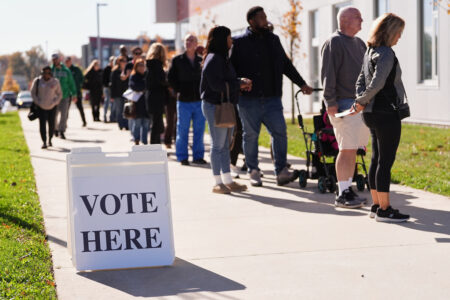Nashua homeowner wins tax-abatement appeal; is granted attorneys’ fees in separate RTK case against city

Telegraph file photo by DEAN SHALHOUP Laurie Ortolano, whose property tax abatement appeal was granted by the state Board of Tax and Land Appeals, shows posters she made depicting property values and assessments in her Berkeley Street neighborhood.
This article, posted Wednesday, July 28, about one of several lawsuits filed against the city of Nashua by Nashua resident Laurie Ortolano, featured inaccurate and incomplete information.
Ortolano currently has four lawsuits pending against the City of Nashua. In relation to these cases, she has filed multiple motions, all of which, except one, were decided in the City’s favor.
The article’s headline reads: “Nashua homeowner wins tax-abatement appeal; is granted attorney’s fees in separate RTK case against city.” This is inaccurate. The court’s decision in the tax abatement appeal was a compromise between the City and Ms. Ortolano’s respective positions. The article states that Ms. Ortolano filed an appeal to the State Board of Tax and Land Appeals for an abatement of her property taxes. The third paragraph of the article reads: “The board recently notified Ortolano that their investigation determined she had in fact been overtaxed in 2018 and 2019, and therefore granted her appeal that Ortolano estimates will lower her annual property tax bill by roughly $8,000.” The $8,000 figure is wrong.
The assessments on Ms. Ortolano’s home were abated, however, according to City of Nashua tax records, as a result of the abatement decision, Ms. Ortolano will not have an annual savings of $8,000 on her property tax bill, but rather will experience a total savings of approximately $5,700 over the course of four tax years.
—
NASHUA – Laurie Ortolano, the Berkeley Street resident embroiled in a nearly three-year property tax abatement case with the city’s Assessing Department, and who asked a Superior Court judge to order the city to pay her attorneys’ fees in connection with a separate, Right-to-Know case, has received favorable rulings in both cases.
Ortolano, whose request for a tax abatement on her 41 Berkeley St. home in 2018 mushroomed into a protracted battle with city assessors and the city’s legal department, prompted her to file an appeal with the state Board of Tax & Land Appeals.
The board recently notified Ortolano that their investigation determined she had in fact been overtaxed in 2018 and 2019, and therefore granted her appeal that Ortolano estimates will lower her annual property tax bill by roughly $8,000.
The city, Ortolano said, pegged her assessment at $710,000 for each of those two years, but the BTLA concluded she should have been assessed at $592,000 for 2018 and $577,000 for 2019, according to the board’s report.
Ortolano said this week that in June 2019, she offered to settle the matter by agreeing to a $595,000 assessment for each year.
“I was willing to accept that and put it behind me, but the city said no,” Ortolano said. “This was an unnecessary suit … the city wasted so much money fighting this, for no reason,” she added.
When Nashua’s assessors granted her neighbor’s assessment appeal – which she helped him with, she said – “I figured the city would settle my case and be done with it. But they refused to do that,” she said.
As for the Right-to-Know matter, which played out in court concurrent with the tax case but has no connection to it, Ortolano accused the city of failing to provide discovery material to her and her attorneys.
“Discovery” in legal parlance refers to written, recorded or physical evidence that the parties are required to share with each other as a case moves forward in court.
In this case, Ortolano, in mid-July 2020, filed a Right-to-Know request with the city for all emails sent by Kim Kleiner, director of Administrative Services, between Aug. 9 through Sept. 30, 2019, according to the order.
“Thirty days passed, then 60, then 90, and no emails,” Ortolano said. “They kept saying ‘they’re coming,’ ‘we’re working on it.'”
Six months later, Ortolano said, the city told her “we’re just about done” and that she could expect them soon.
But when December came and still no response, Ortolano said she “went to court to ask a judge to compel (the city) to release them.”
City Corporation Counsel Steve Bolton filed an objection, calling allegations by Ortolano that the city was acting in “bad faith” by intentionally delaying its response “patently false.”
He also described Ortolano’s motion for sanctions – meaning her request to the court to order the city to pay her legal expenses – as “rife with unsupported and inflammatory allegations, conjecture, and hyperbole unworthy of a motion before this court.”
Bolton goes on to list nearly two dozen points supporting the city’s position that Ortolano’s motion should be denied.
But Judge Charles Temple, in his ruling, found that the city mislead Ortolano regarding the availability of the emails she had requested, and had “disregarded (Ortolano’s) discovery request.”
Temple also wrote that he found “the tone of the city’s objection concerning,” offering as an example Bolton’s statements alleging Ortolano’s motion “is rife with unsupported and inflammatory allegations … ” and that Ortolano’s “behavior in filing this frivolous motion arguably meets the definition of obdurate and obstinate.”
Bolton this week acknowledged the lengthy delay in responding to Ortolano’s Right-to-Know request. “Yes, things slid more than they should have,” he said, but he also noted the circumstances that he said contributed to the delay.
“We were just coming out of COVID, actually we were still in COVID, at the time, we were undergoing renovations, people were working remotely … people who do the searches weren’t available,” he said, referring to the limitations imposed by the pandemic, and the renovation project underway in City Hall.
Ultimately, he said, it was discovered that the emails Ortolano was requesting were among those lost when a backup storage system failed.
“The backup tape was no longer readable … apparently, the material from a certain time frame were irretrievably lost,” Bolton said.
The sharp uptick in the volume of Right-to-Know requests over the past year or two also contributed to the delay, he said.
“We have well over 100 RTK requests we’re trying to deal with,” Bolton said. He also noted that the court “basically said, ‘you’ve got a lot of work to do, but you still need to comply with RTK and discovery rules.”
Dean Shalhoup may be reached at 594-1256 or dshalhoup@nashuatelegraph.com.



